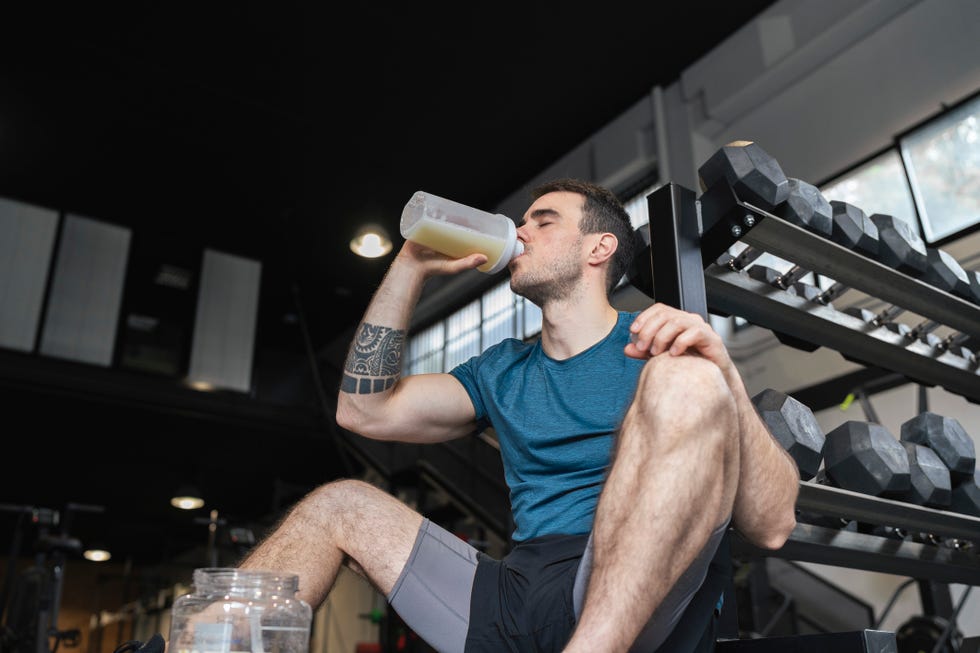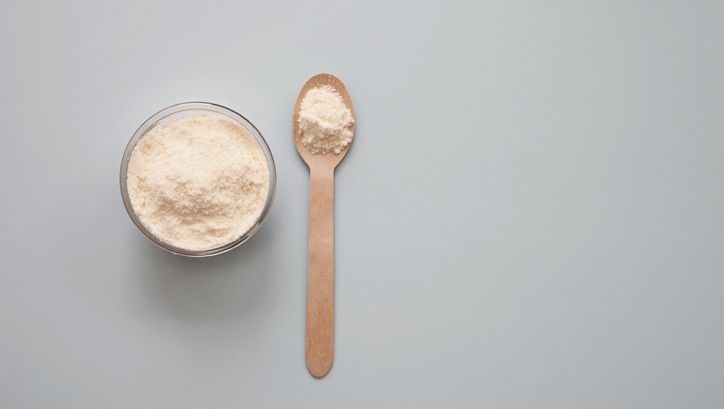PROTEIN SHAKES HAVE become a safe-haven snack. For good reason, too.
They’re easy to whip up when all you need a quick protein hit after a hard workout or on-the-go. If you go the simple route, all you need is some water and protein powder to shake together. Get a little fancier with it and blend in some fruits and vegetables to really create a satisfying snack. Regardless of if you’re a purist or a creative when it comes to concocting your drink, you might catch yourself relying on them quite a bit. But, we probably don’t need to tell you that it’s possible to have too much of a good thing.
Experts advise men get between 1.2 to 1.8 grams of protein per kilogram of your target body weight. For the average 200-pound guy, that means consuming between 108 and 160 grams of protein per day. That’s easy to achieve if you’re reaching for the shaker bottle and protein tub a few times daily. Even though protein powder fills you with similar protein, such as whey and casein, you’d find in chicken, eggs, or beans, it doesn’t contain the other nutrients your body needs from those whole foods.
It’s important to remember that protein powder is a supplement—it’s meant to supplement your already existing diet, not replace it. Here’s how many shakes is too much.
What’s is a Protein Shake?
Believe it or not, the Cambridge Dictionary lists an official definition for the term protein shake: “a drink made by mixing protein powder (=a powder containing a substance that makes the body grow and be strong) with milk or water.”

Sure, some people might make protein shakes by mixing protein powder with liquid, fruits, vegetables, and other ingredients in a blender—but really, that’s a smoothie.
For the sake of this discussion, let’s use the dictionary definition. A protein shake is simply a scoop of protein powder, which typically contains 20 to 30 grams of protein, mixed with water.
Now, not all protein powders are created equal. Animal-based protein powders (like whey and casein, which come from milk) contain all nine essential amino acids, as do some plant-based proteins, like pea protein and soy protein. If you’re using protein powder in lieu of other protein sources, you should opt for those that contain all the essential amino acids.
What Role Should Protein Shakes Play in Your Diet?
“Protein shakes can provide many nutrients for post-workout recovery for an active person,” Megan Byrd, a a dietitian and blogger at The Oregon Dietitian. A 2018 review published in Frontiers in Nutrition backs this up, finding that protein supplementation pre- or post-workout can boost both recovery and performance. The authors found that the amount of protein needed for this boost varied by person and depending on the activity, but generally it ranged from 20 to 40 grams.
Protein shakes can also fill gaps in your diet. “They’re a great way to get a boost of protein for those who don’t generally get enough or who are prone to muscle loss,” like older adults or people with certain illnesses, Byrd says.
How Many Protein Shakes Should You Consume on an Average Day?
While there’s nothing inherently wrong with protein shakes, drinking too many could mean that you’re not getting enough nutrients from other foods.

“In my mind, food should come first,” Byrd says. “But, if you have a food intolerance or struggle to get enough protein in your diet naturally, protein shakes are a great way to get a boost of protein daily.” However, Byrd doesn’t recommend using a protein shake alone to replace a meal, as the nutrient profile doesn’t come close to what you should be getting from a full meal.

“The most I would recommend to an average person is two per day, simply because anything beyond that point is going to cut into your diet in a negative way,” she says. If you work out regularly and you’re trying to build muscle, two protein shakes per day is plenty. And if you’re not that active, you likely don’t need more than one protein shake per day.
If you’re extremely active (more than one workout per day, or extremely long training sessions), three protein shakes per day might be appropriate, Byrd says.
The bottom line? Protein shakes are supplements, not food.
Protein shakes are a convenient and affordable way to up your protein intake, and they can certainly be part of an overall healthy diet. But, protein shakes aren’t food, and you shouldn’t be relying on them too heavily.
Christine Byrne, MPH, RD, LDN, is a registered dietitian and the owner of Christine Byrne Nutrition, a private practice serving clients in Raleigh, NC, and virtually across the country. She specializes in eating disorders and disordered eating, and takes a weight-inclusive approach to health. A longtime journalist, she has worked as a food editor at BuzzFeed and Self, and her writing has appeared in dozens of national media outlets, including Outside, HuffPost, EatingWell, Food Network, Glamour, Bon Appetit, Health, and more.
Note: This article have been indexed to our site. We do not claim legitimacy, ownership or copyright of any of the content above. To see the article at original source Click Here













